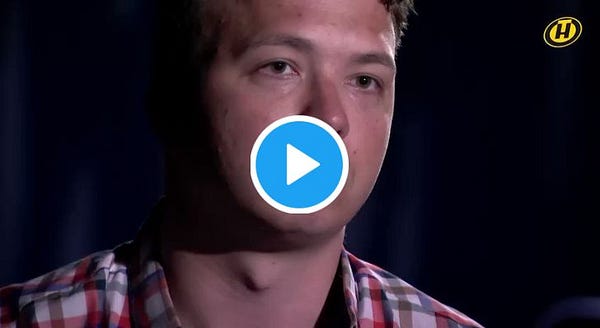The West must punish Lukashenko
Belarus’s actions are piracy, classically defined, and a casus bellum. They demand a thunderous response.
John Oxley, London
A few years ago, I spent some time shadowing a judge at Isleworth Crown Court, observing cases from nearby London Heathrow Airport. Many of the sad sacks on trial elicited a degree of judicial sympathy: drug mules cajoled into doing the dirty work of distant cartels, illegal immigrants escaping from the most dangerous parts of the world. One category of crimes evoked no mercy, however—air rage. Even largely respectable people, with clean records and impressive lawyers, faced the harshest of penalties for drunk and disorderly conduct on a flight. Behaviors that on the ground would warrant a slap on the wrist were rewarded with prison sentences and five-figure fines. The message was simple: There is zero tolerance for endangering an aircraft.
On May 23, a nation-state played the role of the belligerent drunk in seat 23A, forcing down a passenger jet under the pretext of a bomb threat. Now the world must find a suitable punishment to discourage the others.
The circumstances of the disruption are particularly sinister. RyanAir flight 4978 was on a budget journey from Greece to Lithuania, a routine flight along the eastern edge of Europe. As the flight cut across Belorussian airspace to begin its approach to Vilnius, the routine ended. Ground control contacted the pilot, claiming to have received a bomb threat. They ordered the pilot to divert to Minsk, the Belarusian capital, even though Minsk was further away than the original destination. A Belarusian fighter plane was scrambled to enforce the instructions. The pilot had no choice but to comply, even though it’s inherently dangerous to deviate from a planned flight into unfamiliar airspace and unknown conditions.
On arrival in Minsk, it became clear that the authorities had no interest in the purported bomb threat. Passengers were kept on the plane. Ground crew made a slow and perfunctory search of the aircraft. The local security services were intent upon removing just two passengers: 26-year-old journalist Roman Protasevich, and his girlfriend Sofia Sapega. They were dragged from the plane in full view of the passengers, Protasevich shouting that he would be killed if removed from the plane.
In the days following the incident, Belarus’s alibi unravelled completely. According to the pilots, the story they received from Belarusian air traffic control was confused and evasive. Hamas, which supposedly made the threat, denied any knowledge of it.1 Belarus released a video of Protasevich. He had clearly been beaten. It became certain: This was no terror attack averted at the last minute. It was a state-sponsored hijacking.
The motives of the Belarusian state are clear. Europe’s last dictatorship is a pariah state that serves as a buffer between Russia and the EU. President Lukashenko, who has ruled since post-independence elections in 1994, leads an authoritarian and corrupt regime. Last year, he was reelected for a sixth term. Official tallies awarded him 80 percent of the vote. The election was marked by violence, repression, and fraud.2 An unprecedented wave of popular protests ensued in support of opposition candidate Sviatlana Tsikhanouskaya. Independent polling and unofficial election data suggest she had the support of some 60 percent of the electorate.
The protests were savagely repressed. Uniformed and plain clothed police attacked the crowds with batons, tear gas, and rubber bullets. Protestors were bundled into vehicles and taken to notorious prisons, such as Okrestina Street, where torture is rife. As many as 10,000 protestors have been imprisoned and several have been killed.
Roman Protasevich became a key figure in the protest movement. A longtime dissident against the regime, he had fled Belarus in 2019 and claimed asylum in Poland, where he founded and managed Nexta—the key social media channel for the protesters. Nexta became their message board and organising center. The channel documented and broadcast the regime’s crimes, and continues to post daily footage of protests and crackdowns, including images from Protasevich’s own capture. The channel is fascinating and frightening.
It is now clear that unable to entice Protasevich to return to Belarus, the state conspired to kidnap him from international airspace—both an unconscionable attack on one man and an intolerable affront to international order.
Since the protests, the Lukashenko regime has been in a downward spiral of repression. Recently the dictator ordered the shutdown of the portal TUT.BY, a reliable source of Belarusian news whose popularity in Belarus exceeded YouTube’s, then whipped up a manufactured plot that, he claimed, was aimed not only at ousting him, but murdering him and his children. Now, for the first time since the fall of the Soviet Union, the iron curtain has been hung anew: Belarusian citizens have been prohibited from leaving the country.
Yesterday, Protasevich appeared on Belarusian state TV. Makeup covered his bruises. He praised Lukashenko. “I realised that many things Aleksandr Grigoryevich [Lukashenko] is criticised for are just attempts to pressure him, and that in many moments he acted like … a man with balls of steel,” he said.






At the end of the interview, Protasevich began to weep and covered his face with his hands. He said he hoped someday to be able to have a family.
Public torture, in the middle of Europe, in the 21st century. This disgrace—this affront to the conscience and decency—has Vladimir Putin’s enthusiastic support. The more we learn about this operation, the more closely coordinated with Russia it appears. Foreign Minister Sergei Lavrov intoned that Belarus had taken an “absolutely reasonable approach.” Margarita Simonyan, the propagandist-in-chief of the news network RT, tweeted her admiration of the Belarusian leader’s skill and cruelty: “I never thought I could envy Belarus for anything. But now I’m kind of jealous. Lukashenko did a superb thing.” In her next tweet, she quoted the lines of a popular song by Vladimir Vyssotsky:
My official comment to all the media that bombard my phone with their questions about Protasevich: In Leningrad, at the crossroads of Piat Uglov, Sania Sokolov was beaten up. He was causing mayhem and singing out of tune, and we treated him right.
Protasevich’s girlfriend, a Russian citizen, was detained with him. She has has not been released, but the Russian Foreign Ministry has uttered not a word of protest. Days after the hijacking, Putin hosted Lukashenko at the Russian resort city of Sochi; after hours of conversation, the two men departed on a luxury yachting excursion on the Black Sea. Moscow offered Minsk a US$500 million loan and increased flights to Belarus as a show of support.
Over the past two years, the Russian and Belarusian secret services’ collaboration has deepened. Even before last August’s protests in Belarus, the regimes exchanged lists of enemies. Moscow arrested Minsk’s dissidents in Russia, as a courtesy, then sent its propagandists to Belarus to help craft the regime’s media narrative.
Civil aviation relies on agreements and standards among nations, with few enforcement mechanisms to back them. Interference with airlines can be deadly, and should therefore only happen in the most extreme of circumstances, with the cooperation of all parties. Airlines have been diverted before to allow high value fugitives to be captured, but never by invoking a false bomb threat.
To grasp how grave this was, consider the MiGs the regime despatched. Since 9/11, it has been widely understood that a wayward airliner that fails to obey instructions may be shot down. The threat was implicit. Unless the pilot acquiesced to Lukashenko’s scheme, everyone on board could be killed. If there are no penalties for such an act of piracy, every aircraft in the world is endangered, and we are all in danger. Exiles, asylum seekers, and foreign nationals alike will fear traversing the airspace of hostile countries. Unless Belarus is punished for this, meaningfully, every thuggish regime in the world will be emboldened, especially those in countries that cannot easily be flown around.
Belarus’s immediate neighbors called for tough action from the European Union. The EU has passed a range of sanctions against senior Belorussian leaders, and the EU and UK have banned their airlines from flying over the country. This ensures no further flights will be interrupted, and it denies Belarus so-called fly-over fees, a source of hard currency for the country. But in solidarity with Belarus, Russia retaliated by turning back foreign planes that had not entered through Belarusian airspace. EU countries, therefore, have cancelled inbound flights from Russian airlines. This scrambles Europe’s aviation map. Diverting aircraft means longer flights, more fuel burned, more stopovers for refueling, higher costs to passengers. European aviation, already devastated by the pandemic, can ill afford this blow.
Protasevich remains in a Belarussian jail, where he is being tortured and where he may be killed. Thus far, the EU’s response amounts to this: If you hijack our planes, you may face a very steep fine. Lukashenko got the man he wanted. He probably feels it was worth the cost.
Had a civilian done what the Belarus state did, he would be facing a life-ruining sentence from the judge at Isleworth. Had a terrorist group done it, military action would have been launched the same day. Belarus has graduated to full-fledged terror state. Sanctions and flight cancellations are not enough.
Belarus’s actions have undermined international air travel and security and compromised the EU’s status as a safe haven for foreign dissidents. Indeed, it has demonstrated that the EU is unable even to protect its own citizens from state-sponsored hijackings. The EU is now a portrait of impotence in the face of an international outrage.
The West must urgently cohere around a collective, comprehensive answer to this abomination. Putin and Lukashenko have shown that they can, and will, endanger hundreds of foreign civilians in pursuit of regime critics, whether through nerve agent attacks or aircraft seizures. Western spinelessness is priced into their calculations: Each time, they escalate in the confidence that the West’s response will be predictable and feeble.
The EU, UK, and US must prove them wrong. They must find a way to disentangle themselves from Russian influence and respond robustly, for once, to the repeated flouting of international law. Cancel Nord Stream 2. Bulk up NATO forces around Belarus. Expel every Belarusian diplomat engaged in espionage—we know who they are. Wrap up their informal networks—we know who they are, too. Suspend all trade—no more pinprick sanctions. An atrocity of this magnitude warrants a blockade, one explicitly aimed at toppling that miserable regime. Seize every penny of the leadership’s money and use it to pay compensation to the victims.
Belarus’s actions are piracy, classically defined, and a casus bellum. They demand, for once, a thunderous response.
Hamas Political Bureau Moussa Abu Marzouk condemned Minsk. “This is outrageous and demonstrates the archaic way of thinking of the Belarusian government, which does not understand that we are now living in an age of free media and that there is international public opinion that no longer accepts such methods.” Quite an achievement to behave so barbarically that Hamas looks down upon you.
Cosmopolitan Globalist Vladislav Davidzon reported extensively from Belarus until it became obvious that if he stayed, he would meet the same fate. We recommend his dispatches from Minsk, especially A Popular Revolt Against a Pro-Russian Dictator and Crushing Democracy in Belarus. We also commend to your attention the podcast he recorded recently with Hanna Liubakova, Europe’s Pirate State.








What "thunderous response" do you suggest?
Casus belli [unfortunately, I've not yet figured out how to do basic HTML tags in the comments] generally want war as the response.
Perhaps another response would be to simply identify where Protasevich and his lady are being held, and simply go in and get them. The humiliation that would inflict on Lukashenko--and Putin--might be sufficient response.
We always can go to war tomorrow.
Eric Hines
The question at hand is a simple one: Is the West—if that remains a valid term—willing to do anything about this outrage beyond the symbolic and the rhetorical? Now in my opinion that’s a question asked and answered. But I’d be glad to learn—with evidentiary support—that I’m being unduly cynical.